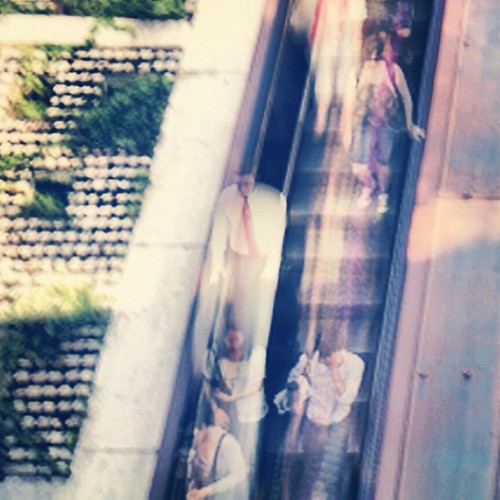 In this iPhone photo, morning commuters ride the escalator down into the Dupont Circle Metro. I used Slow Shutter for the long exposure and then modified it in Instagram.
In this iPhone photo, morning commuters ride the escalator down into the Dupont Circle Metro. I used Slow Shutter for the long exposure and then modified it in Instagram.
This photo is available as a canvas print from Instacanvas.
writer, photographer, web person from Washington, DC.
 In this iPhone photo, morning commuters ride the escalator down into the Dupont Circle Metro. I used Slow Shutter for the long exposure and then modified it in Instagram.
In this iPhone photo, morning commuters ride the escalator down into the Dupont Circle Metro. I used Slow Shutter for the long exposure and then modified it in Instagram.
This photo is available as a canvas print from Instacanvas.
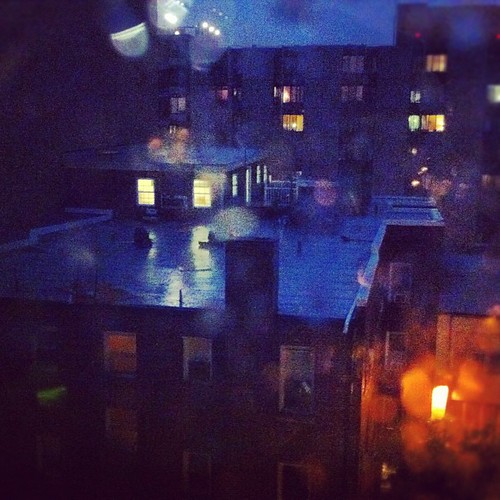 The storm blew up out of nowhere. One moment, the night was calm. The next, it looked like a hurricane. Waiting until lightning illuminated the scene, I took this iPhone photo out my window. After being Instagrammed, it’s got an Impressionist feel to it.
The storm blew up out of nowhere. One moment, the night was calm. The next, it looked like a hurricane. Waiting until lightning illuminated the scene, I took this iPhone photo out my window. After being Instagrammed, it’s got an Impressionist feel to it.
If you like this photo, buy it on Instacanvas.

Matthew Modine: Keep Your Mouth Shut
Interview by Joe Flood
On Tap, July 2012
Mathew Modine wants to retain the mystery at the heart of The Dark Knight Rises. In this interview with OnTap, the veteran actor discusses what attracted him to the Batman franchise, as well as the experience of working with some of film’s greatest directors.
There is a lot of mystery surrounding the character you play in The Dark Knight Rises – what can you tell us about him? What attracted you to playing this role?
There is a lot of mystery surrounding the role because there isn’t anything I can tell you about the character. This should be a lesson taught in schools. Keep your mouth shut. My father used to say, “It’s better to be thought a fool than to open your mouth and remove all doubt.” Christopher Nolan and his team clearly understand the power of keeping your mouth shut.
What attracted me to Dark Knight Rises was the team. Starting with the director, writers, producers and the extraordinary team of actors assembled. To be a part of that team, of their caliber is its own reward.
What was it like working with Christopher Nolan? What was the set like? Did you get a lot of direction from him?
Nolan is an old-school director. He is cut from the cloth of the best. A film set is very much like a ship at sea and a film director is like the Captain of that ship. A successful Captain understands, deeply, his dependence on his officers and crew and its necessary for the officers and crew to be led and take orders from their Captain, who must assert confidence in his wishes and commands, be decisive in his decisions and in complete control of his ship. That’s Nolan – from the time he gets out of the car to start the days work until he gets back in the car to go home.
You’ve worked with many of the most highly regarded directors in the film industry including Oliver Stone, Stanley Kubrick and Robert Altman. How do you adjust to each director’s style? Do you adapt to them or do they adapt to you?
The best directors are great casting directors. They cast their films well. Musical conductors aren’t coaching their musicians on how to play. You don’t get into the orchestra if you’re still trying to master your instrument. They show up, knowing their notes, how to interpret the piece of music, and the conductor then, simply with a gesture of the hand, a look, encourages the musician to play a little softer, a little faster or slower. This is what the best directors do. WIth subtle gestures and simple suggestions they encourage their performers. A great director is a master of manipulation, and so good at it, that it never feels like manipulation.
Were you a fan of the Batman comics as a kid? How is today’s Batman different from the one you grew up with?
Well, I grew up with the TV series. Which I loved. Even as “camp” as it was, there was something weirdly mysterious and dark about it. Never cared much for Robin. But Bruce Wayne, as played by Adam West, was so odd and cool. West’s slow, stuttered speaking, his contemplation about problems and how to solve them made him very compelling. Nolan’s darker, more realistic telling of the story, is for me, the most compelling from all the films made by the various other film makers. It strikes the perfect balance of myth, drama, opera, humor, and compelling cinematic storytelling.
What’s it like to get your own unofficial Dark Knight Rises poster? What do you think about fans creating art and other types of content around movies?
When I saw the poster, which was sent to my @matthewmodineTwitter account, I was flattered to the point of awkwardness. Whomever it was that decided they’d sit down and spend the day creating a poster of my character, is a person has, first, wonderful talent – the poster is just awesome – and second, they’re just crazy to have been so generous!
According to IMDB, Liam Neesen is teaching you to fly-fish. How intense of an experience is that?
You gotta love IMDB for random facts that get randomly posted and never vetted for truth or relevance. Liam is a dear friend. We did go fly fishing, a few times. But this posting on IMDB presents a scenario that expands with each viewing and telling. Imagine Liam, my fly fishing teacher and me, his wide-eyed student standing in rubber waders in a gently flowing river… Liam coaching me work the tied-fly to gently, lightly tickle the surface of the water… the whole picture just makes me giggle. Brokeback River.
Do you have any connections to Washington, DC? What do you like to do when visiting here?
No. I don’t. I love our Nations capital though. The monuments. The precious ideals of our democracy and that the “great experiment” that must constantly be examined and polished and lived up to. Our government is unique in that it is not stagnant. We are a progressive nation. Like that word or not. We are a liberal nation, like that word or not. We have amendments to back it up. The 13th amendment which ended slavery. The 15th amendment which gave African-Americans the right to vote. The 19th, which gave woman the right to vote. The next necessary amendment, which cannot come soon enough if we are to survive as a nation of citizens – and not a country controlled by banks and corporations, is an amendment for campaign reform. Campaign contributions may be one of the greatest threats to domestic liberty and our first amendment rights.
Can you talk about the Steve Jobs movie or your nonprofit Bicycle For A Day?
Bicycle for a Day is a not for profit designed to get young children and adults back on bicycles. Obesity and early onset diabetes affect more than half our nation. Choosing to ride a bicycle for short trips, to school, to friends homes, to the mall, can help create lifestyle changes. Not only do you become more active and engaged with the outdoors, but you are making a measurable, immediate, positive impact on the environment by not using a gas powered motor vehicle which contributes to climate change.
I leave for Los Angeles to start filming on jOBS the third week of June. I haven’t met with any of the other cast members but I am looking forward to it and getting started. I will have the opportunity to meet with John Sculley, the man who fired Steve Jobs from Apple, and whom I am portraying before I leave. I am really looking forward to this meeting and hearing the story from his perspective.
The biggest challenge in being a Web Content Manager is not learning HTML or dealing with the complexities of social media. It is a more prosaic one – how do you get people to write content for your web site?
I’ve worked in web content for organizations large and small, in government and outside of it. The same problem comes up again and again. An organization wants a web site that contains timely, accurate, relevant and (hopefully) engaging content. But they are dependent on people with various levels of interest to actually write the content.
Web sites rely on these subject matter experts (SMEs). They produce program descriptions, product pages, explanations of government procedures, “about us” pages, executive bios, instructions on how to fill out forms and everything in between. This content is the vital core of the web site; without it, you have an empty shell.
Most of the time, these people don’t work for you. They’re in some distant department, charged with updating their section of the web site. They have differing levels of comfort with writing. They may, in fact, hate to write and look at producing content for the site as some onerous chore.
How do you get SMEs to write content for the web site?
Sell Them
How much traffic does your site get? Has it won any awards or received recognition? Do you have a file of nice comments from readers? Share this information with your SMEs. Let them know how much the web site matters and how important their content is to it. I suggest reporting web metrics to your SMEs. Give them numbers that they can share with their bosses and brag about.
Tip: Put all your web metrics, awards and nice comments into a fact sheet or web page that you can easily share.
Respect Their Time
Make the content submission process as painless as possible. Have an editorial guide to share with SMEs, as well as quick description of how the publishing process works. State what you need from them clearly and concisely, with word counts and deadlines. Don’t inundate SMEs with information that they don’t need to know, like esoteric web technologies that they’re not going to see. Give them deadlines that are doable but not so far in advance that they seem theoretical. I like deadlines in the 2-4 week range.
Tip: Create an online editorial kit for contributors, with everything writers for the site need to know.
Peer Pressure
You think such childish tactics don’t work on senior staff? You’re wrong. Telling a GS-15 that all of his peers have updated their sections of the web site but he hasn’t – that really works. Someone should write a research paper on the use of playground tactics in the office.
Tip: Hang a chart in your office listing sections of the site and if they’re up to date.
Write It Yourself (Not Really)
Early in my career, I wanted a designer to help me design a new section of the site. He said he was too busy. So I built a rough layout myself. After I showed it to him, he took one look and said, “This is terrible. I’ll do it.” Problem solved. Sometimes, people just need something to respond to. Put your ideas on paper and show them to your “too busy” SMEs. They may find it easier to work from something that you’ve started.
Walking Around
The content published to the web site is just a fraction of the content produced in your organization. As a Web Content Manager, your job is tell the story of your organization online. You need to know what’s going on in different departments, what they’re working on and what’s coming up. In a nonprofit I worked for, I did this by walking around. I’d talk to the press people and magazine editors and writers that I knew. Dropping in on them, I’d find out if they had anything good that I could put up on the web site.
Tip: Formalize the “walking around” process by having a SME group that meets regularly. Though this isn’t as fun as walking around.
Web technologies come and go. Policies, procedures and government requirements change. But the one constant in web site management is the problem of getting people to write content.
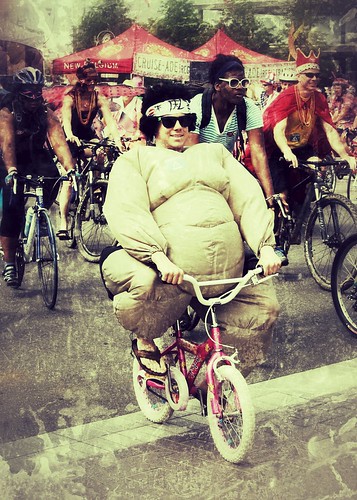 A scene from Tour de Fat, a celebration of bikes and beer sponsored by New Belgium. Taken with a Canon Rebel T2i – extra funkiness added with Snapseed, an iPad app.
A scene from Tour de Fat, a celebration of bikes and beer sponsored by New Belgium. Taken with a Canon Rebel T2i – extra funkiness added with Snapseed, an iPad app.
Join me on May 12 at 3 PM for an online chat about my novel Murder in Ocean Hall. My mystery about the murder of the world’s most famous ocean explorer is the first book club selection of the Independent Author Index. This new site is a place where “readers meet authors” and is a good example of how communities are forming online to discuss books.
Looking forward to answering questions on May 12!
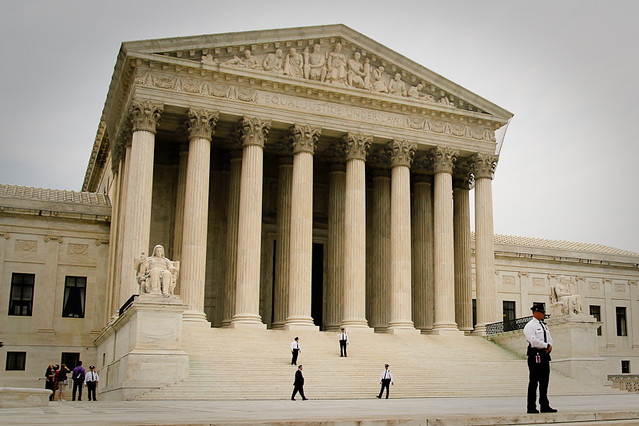 While the Supreme Court heard the Obamacare case, protests against the law were held outside. The media and demonstrators were careful not to get on the steps of the Court, which were under the protection of the Supreme Court Police.
While the Supreme Court heard the Obamacare case, protests against the law were held outside. The media and demonstrators were careful not to get on the steps of the Court, which were under the protection of the Supreme Court Police.
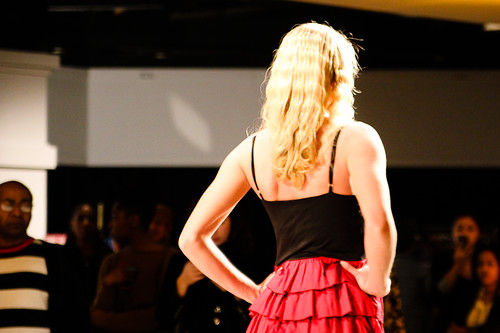 A model stands at the end of the runway during Crystal Couture in Crystal City, VA. Her pose reminded me of the cover of The Winner Stands Alone.
A model stands at the end of the runway during Crystal Couture in Crystal City, VA. Her pose reminded me of the cover of The Winner Stands Alone.
 OccupyDC still occupies McPherson Square. I was there on the day that they were supposed to be evicted. Nothing happened, except for this tent-raising, where OccupyDC covered the statue of General McPherson with a Tent of Dreams.
OccupyDC still occupies McPherson Square. I was there on the day that they were supposed to be evicted. Nothing happened, except for this tent-raising, where OccupyDC covered the statue of General McPherson with a Tent of Dreams.